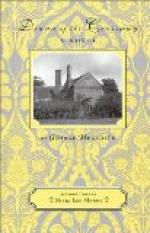Redworth struck on a southward line from chalk-ridge to sand, where he had a pleasant footing in familiar country, under beeches that browned the ways, along beside a meadowbrook fed by the heights, through pines and across deep sand-ruts to full view of weald and Downs. Diana had been with him here in her maiden days. The coloured back of a coach put an end to that dream. He lightened his pocket, surveying the land as he munched. A favourable land for rails: and she had looked over it: and he was now becoming a wealthy man: and she was a married woman straining the leash. His errand would not bear examination, it seemed such a desperate long shot. He shut his inner vision on it, and pricked forward. When the burning sunset shot waves above the juniper and yews behind him, he was far on the weald, trotting down an interminable road. That the people opposing railways were not people of business, was his reflection, and it returned persistently: for practical men, even the most devoted among them, will think for themselves; their army, which is the rational, calls them to its banners, in opposition to the sentimental; and Redworth joined it in the abstract, summoning the horrible state of the roads to testify against an enemy wanting almost in common humaneness. A slip of his excellent stepper in one of the half-frozen pits of the highway was the principal cause of his confusion of logic; she was half on her knees. Beyond the market town the roads were so bad that he quitted them, and with the indifference of an engineer, struck a line of his own Southeastward over fields and ditches, favoured by a round horizon moon on his left. So for a couple of hours he went ahead over rolling fallow land to the meadow-flats and a pale shining of freshets; then hit on a lane skirting the water, and reached an amphibious village; five miles from Storling, he was informed, and a clear traverse of lanes, not to be mistaken, ‘if he kept a sharp eye open.’ The sharpness of his eyes was divided between the sword-belt of the starry Hunter and the shifting lanes that zig-tagged his course below. The Downs were softly illumined; still it amazed him to think of a woman like Diana Warwick having an attachment to this district, so hard of yield, mucky, featureless, fit but for the rails she sided with her friend in detesting. Reasonable women, too! The moon, stood high on her march as he entered Storling. He led his good beast to the stables of The Three Ravens, thanking her and caressing her. The ostler conjectured from the look of the mare that he had been out with the hounds and lost his way. It appeared to Redworth singularly, that near the ending of a wild goose chase, his plight was pretty well described by the fellow. However, he had to knock at the door of The Crossways now, in the silent night time, a certainly empty house, to his fancy. He fed on a snack of cold meat and tea, standing, and set forth, clearly directed, ‘if he kept a sharp




